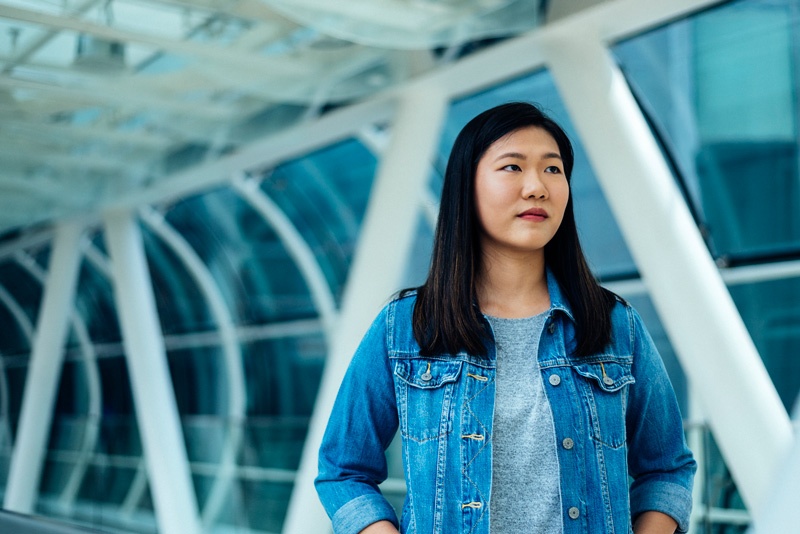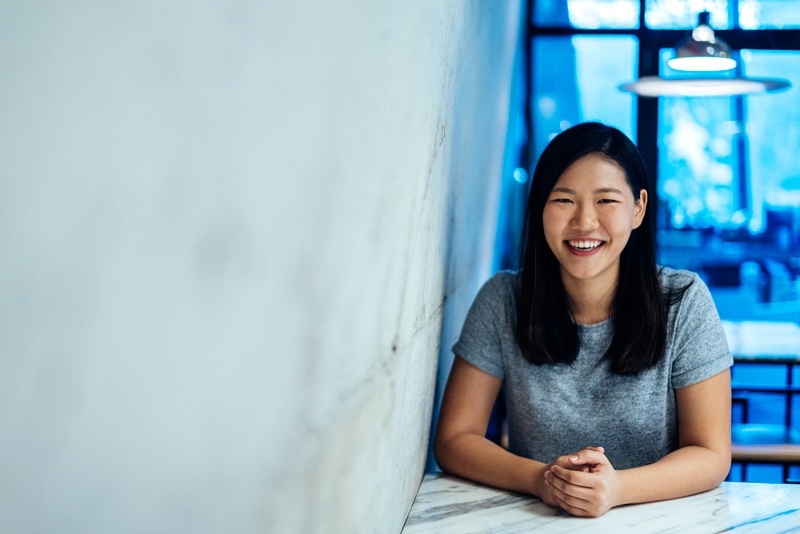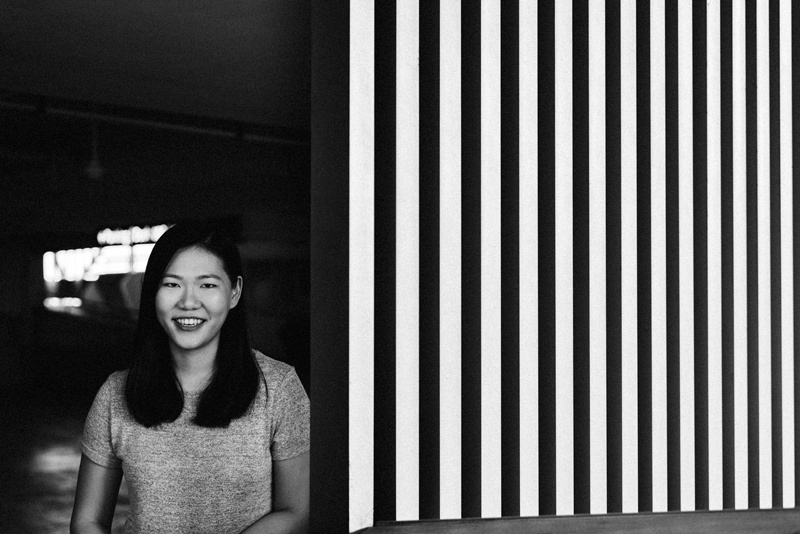Annabelle Kwok: Debunking AI Myths & Cutting Through the Hype

“I said, I'm going to Africa to stay for 2 months, and you can't stop me.” Annabelle Kwok laughingly recounts to me her experience travelling to rural Africa, while still a student at university. “My mom tried to discourage me but I was so adamant on the trip, I bought a round-trip ticket and just went ahead. Over there I got robbed at knifepoint, was chased down a street by a man wearing nothing but electric blue briefs, and had a near escape from being raped.” It’s hard to tell if that experience might have dampened Annabelle’s taste for adventure, because as she sits across from me with a green smoothie that she ceremoniously declares “very healthy tasting”, the 24-year-old whiz kid and co-founder of Artificial Intelligence (AI) firm, SmartCow, is irresistibly and effervescently cheerful. Young and freshly equipped with a mathematics degree (that she completed in 3 out of 4 requisite years), Annabelle first began gaining mainstream media attention with SmartCow’s Tera+ board, a powerful single-board computer that provides viable non-cloud computing security to businesses and organisations, while efficiently reducing the hefty infrastructure and maintenance costs of a local server setup. Often seen as something of a poster child for Singapore’s nascent AI industry, Annabelle’s remarkably suited for the role. She’s well-spoken and extroverted, and seems ever ready with quips and charming anecdotes that make interviewing her feel like I’m speaking to a friend. The industry maverick has dabbled in film-making and made an ad which ran on national television for 3 months, joined and performed in a circus, and participated in youth programmes representing Singapore where she got to meet former US president, Barack Obama. “I think he flirted with me, by the way!” she says animatedly, bursting into giggles. “When our group of delegates met him, I kept thinking: maintain strong eye contact… strong eye contact… because I was hoping that he’d notice me. And eventually, he winked in my direction!” Young, irreverent and full of chutzpah, Annabelle refuses to take herself too seriously. “I like to have a non-linear approach to life and pick up different things, even small skills, which does your brain good. You are exposed to different perspectives and you don't get stuck in rote learning. Learning acting for example, taught me to ask questions like, Who am I? What do I believe in? Now I constantly reflect on myself and think through what is it that I am trying to pursue with every course of action.” As she embarks on her latest venture, NeuralBay, I’m curious to know what she’s working on in her personal time, to keep herself on her toes. The black belt holder in Taekwondo has been taking classes in gymnastics and parkour, and tells me she’s looking to get back into doing Mixed Martial Arts (MMA). “The great thing about MMA is that you can only train yourself up to a certain point. When you're in the ring with someone else, it's a whole different game—you don't know what to expect, and you have to learn to adapt in the moment.”
TEO REN FENG: I understand that you are leaving SmartCow to start a new AI venture.
ANNABELLE KWOK: Yes. At SmartCow, we would get a lot of requests from people who think our AI system is really great, and want to know how they can implement it in their businesses or buildings. But they hesitate after finding out that the costs of AI can be prohibitively high. AI is supposed to be a disruptive technology, meant to bring about positive changes, improve security and data analytics for retail, and enhance the overall experience for a user—the goal is to create a happier place, a better world. What I’m going to do in the new company is closer to what I want to achieve, which is to make AI more affordable and easy to use.
REN FENG: Do you feel any apprehension leaving SmartCow when it is doing so well?
ANNABELLE: With any start-up, you have ‘pivot’ moments. We realised that in order to sell our boards, we needed to venture into software to give value to our clients. Companies get very excited about the possibilities of what they can do with AI, and hardware is just a small component of what they want. However, I’ve had to tell them that I’m only selling the board, so they still needed to find another company to write the software for them. Unfortunately, the AI scene is still very new here, and there aren’t many companies that can provide them with such solutions. There’s been a lot of interest expressed, and SmartCow has done a lot of projects exploring various verticals in different industries, so I more or less know the ones I want to venture into—where I can make the most impact, and where it is most profitable. [laughs] We are running a business after all.
REN FENG: What’s your new business going to be called?
ANNABELLE: NeuralBay. I can build on-site computing or edge computing for clients so they have options, but our primary focus will be software geared towards industries. They pay for the features that they need. Currently, software companies only provide one of many aspects of service that a business or organisation might need. What I want to do for various industries is to come up with a whole suite of services for them. Is it 100% deep learning AI? Probably not, but it will incorporate elements of that to provide real solutions that actually solve problems.
REN FENG: What real-world applications can we expect to see?
ANNABELLE: It can vary from security set-ups to retail analytics suites measuring window shoppers and how well a store’s display works; i.e. the number of shoppers that look at it and decide to go inside, and bounce rates on items like how often it is picked up, then put down, which might indicate a need to adjust pricing, for example. Our clients can choose whether to purchase the software for window shoppers or VIP shoppers, with know-your-customer services that can identify whether the person walking into a bank is a Privilege banking customer.
REN FENG: Which companies have been interested in implementing such technology?
ANNABELLE: Some of our first clients include Singapore Changi Airport, the Ferrero Group as well as Indonesian companies. A lot of people shop online in Singapore, but retail is still very traditional in Indonesia and many shoppers don’t have credit cards. A majority still go into a store to buy, and for us, it’s all about converting offline information into useful, online data.
"We’ve got to be real about what AI can do for us."
REN FENG: How far away are we from living in AI-powered cities?
ANNABELLE: I think we're still some distance away from seeing a smart nation that's entirely powered by AI. IoT (Internet of Things) has created all these sensors and excellent data input peripherals. In the next few years, you will see tons and tons of data being generated, so you'll need something to handle 3 things: Volume, Variety and Velocity of the data that's coming in. That's where AI would really help, because it is essentially no better than a software that does processing, and how you actually process this data to come up with something meaningful and to bring about a better change for businesses or individuals, is where the real benefit will lie. We’ve got to be real about what AI can do for us.
REN FENG: You've spoken about managing the hype surrounding AI. How much do you think we run the risk of building another bubble?
ANNABELLE: We have to manage it very carefully, especially since we've gone through 2 'winters' already. The thing about the resurgence of AI this time around, is that we now have the hardware, plus the people who are leading it actually know what they are doing. Google and Facebook have a treasure trove of information right now. AI will definitely get over-hyped, but as with any hype, there will be some real change or progression that comes with it. I wouldn't guarantee that 100% of the AI start-ups that you see today will be building useful AI technologies. But out of these, there will definitely be some of them that can bring us forward as a society.
REN FENG: What is your vision of a future that integrates AI into our lives?
ANNABELLE: Something that isn't too futuristic—pretty much be like what we have now, but more intuitive. Disruption doesn’t involve coming up with things that people are entirely unfamiliar with. It’s taking the things and practices that they are already comfortable with, and looking at how you can improve the efficiency and productivity. We will still be humans that need to eat, sleep, bathe and get from one place to another. It's just a matter of how we do things that will change.
REN FENG: Do you believe in the AI apocalypse?
ANNABELLE: I think we don't really have a good understanding of AI: what it can do, and especially, what it cannot do. And how I see it is that when people don't understand things, there are 2 reactions: fight or flight. The ‘fight’ response involves acts like killing all the indigenous people on a land, or seeing threats to your way of life, jobs, etc. The alternative is to start worshipping the unknown as a mythical force with omnipotent powers. That's how we come up with all these sci-fi fantasies with all these amazing inventions. People like to dream, and there's nothing wrong with it because the narratives that we tell today, determine the technologies that we will develop in the future. But we also need to be grounded and focus on what is real: what is actually in front of you and how you can push it to the next stage. The Agriculture and Industrial Revolutions took away jobs but also created new ones. Likewise, the Information Revolution is going to take away jobs in this age, yet at the same time, create new ones.
REN FENG: Do you think working in the AI scene will be a lifelong interest/endeavour for you?
ANNABELLE: It’s hard to say, right? Like, where do you see yourself in 20 or 30 years? I don’t know, especially with the rate things are moving at. But I'm a big believer in just following your interests.
"I chase after challenges—problems with solutions that lead to actual, positive impact."
REN FENG: What is your ultimate goal in life?
ANNABELLE: I don’t chase after money, that’s for sure. I chase after… [laughs] I like to make things difficult for myself. I like problems. I chase after challenges—problems with solutions that lead to actual, positive impact. I want to focus on the real stuff instead of working on things that are nice to have, but are just fluff. Everyone is always publishing papers discussing how we can make life better, how we can do this or that. But if you end up chasing research, you never really get down to implementing. So I look at problems and work on their solutions.
REN FENG: Do you ever see yourself being a part of Google's DeepMind?
ANNABELLE: That would be really fun. But as long as I am doing good work and helping people, that's good enough for me. I think their work is really amazing, and if they make their research open source, then hurray for everybody. I'm very pro open source culture because I learnt what I know through that, and I think that's how we should progress as a society. It’s not about a “me-first” attitude, but being more inclusive so that everyone can benefit.
REN FENG: It seems very competitive to stay on top of the AI game right now.
ANNABELLE: That's the trouble with being in the big-boys' league, and also why I steer clear of VCs. You know their agenda is money—profits. You are just another company in their portfolio and although they do believe in you, money is their ultimate motive. I am very fortunate to be surrounded by investors who are already accomplished in life. They are retired, old, balding men [laughs], who meet me after finishing a round of golf or from dropping their grandkids off at school. They discuss values, morals and ethics—how important they are in life. And they remind me to think about who I'm impacting, and whether there is true benefit. I like their perspective, instead of an attitude driven by money.
REN FENG: You're known for your energetic, can-do attitude. What are your greatest disappointments thus far?
ANNABELLE: [long pause] I feel disappointment all the time because I am a perfectionist. I always want to do things better, when others are content with having something that works fine—which is also good for me, because if I spent all my time perfecting something, I will miss the boat. Another disappointment is what I see around me. When you graduate and want to work on a start-up or something similar, you get really enthusiastic and hyped-up because you want to create change. But then you go into a lot of meetings and realise that many people don't know what they are asking for—these are companies that govern and hold massive amounts of power, so you would assume that they know what they are doing. However, after meeting and talking to them you go home thinking: Oh no! Our world is being led by people who don't know their stuff! I think that was one of the biggest shocks to me.
REN FENG: Do you believe that rules are meant to be challenged and broken?
ANNABELLE: I don't see a rule and think: Alright, I'm going to challenge it. I'm going to swim in an ocean with sharks. [laughs] But one thing that we learn in mathematics is always to ask why. So if rules are set or in place, then why? We need to try to prove and disprove things.
REN FENG: Do you see attempts to create human-like AI as acts of hubris?
ANNABELLE: Well... If that's what someone wants to do, then by all means, go for it. I don't know what to feel. [laughs]
"I'm perfectly fine concluding that sometimes, I just don't know why."
REN FENG: Does that sit well with your personal and religious views?
ANNABELLE: I'm not a religious person: when things happen, I'm perfectly fine concluding that sometimes, I just don't know why. I grew up in a Catholic school, I’ve lived with monks and nuns, witnessed voodoo in Africa, and practised Vipassana, which involves 10 days of no reading, no writing, no eye contact or talking. And I talk a lot. [laughs] I think people try too hard to always find a reason for things. For example on the neural network, certain things happen and people get very frustrated trying to figure out the cause and start fretting that there are unknown forces at work. Sometimes you just have to accept that you just don't know.
REN FENG: How much of the success and attention that you’ve garnered so far, is a result of you being one of the few players in the local AI scene?
ANNABELLE: I’ve been very lucky to get in the game early. You can count the number of people like me in the local AI scene with one hand. I have no doubts that there will be more players coming in, but this is not a subject area that is taught in school. I studied neural networks at school, which formed the foundation of my AI learning, and I’m blessed to have a very good mathematical and engineering background that enabled me to pick up this subject quickly. But taking tech knowledge and translating it to industry application involves a lot of trial and error, self-exploration and learning on your own, which is not the traditional way of education in Singapore. Flying solo and deciding to do things on your own are normally business students who are interested in being entrepreneurs, and they hire CTOs for the work that I do. [laughs]
REN FENG: As a young woman working in the tech industry, what challenges have you encountered?
ANNABELLE: Being a woman has actually been an advantage. You get a lot of attention in a field where there aren't many girls. I don't want to play the 'woman card', but when you are a girl... like, if I get tired hammering something, men will tell me: “Don't worry, let me take over.” [laughs] Being young however, is a very big problem. I was already in the start-up scene before graduating from university, and I’ve learnt that if you try to dress like a corporate person to match the senior, corporate leaders you’re meeting, they end up treating you like any other young person in the corporate world. You can tell even from the way that they talk to you—they don't treat you with a lot of respect, even though you know your stuff. And it's very hard to have a conversation with someone who is not interested in having a conversation.
You want people to respect you not by what you wear, but for what you know, have done and can do.
REN FENG: How have you dealt with it?
ANNABELLE: YOLO! [laughs] I decided to just be young, since I can’t change my age. Now I go into meetings in sweatpants or even with headphones around my neck. Sometimes they’re not even plugged into anything, the wire’s just sitting in my pocket. [laughs] And the same people look at me and go: “Oh, young kids these days…” There's a totally different attitude and perception. Ultimately, just be yourself.
REN FENG: What’s been your biggest takeaway as a young entrepreneur?
ANNABELLE: Sometimes you just need to get things done first so that people can start believing in you, which is what I did with SmartCow. When I first started out, people thought: “Oh, she's just a young girl with an idea, and everybody has ideas.” In Singapore, especially, people like to celebrate ideas but don't actually take you and your capabilities seriously until you have built something. It's only after we came back with the actual board, that people took us seriously. Big companies and institutions began to ask the right questions and directed us to truly useful sources and contacts. It's a very different kind of respect and feeling, and you want people to respect you not by what you wear, but for what you know, have done and can do. That's what counts.
****
Edited by Wy-Lene Yap




